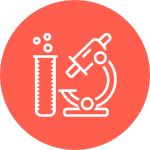Gain the skills you need to be an NHS Clinical Scientist specialising in genomics.
Follow this pathway through the Scientist Training Programme (STP) and you’ll play a crucial role in diagnosing, monitoring, and treating genetic conditions.
This three-year fully funded course combines academic learning at The University of Manchester with clinical training in NHS Trusts.
What is the role of an NHS Clinical Scientist working in genomics?
NHS Clinical Scientists in genomics play a vital role in diagnosing and treating genetic conditions.
They work within the NHS Genomic Medicine Service (NHS England) and are responsible for analysing genetic material to understand how variations in genes may contribute to specific diseases.
For further information about the role please see the NHS Healthcare Careers website.
Why study MSc Clinical Science in genomics?
Course description
Our MSc in Clinical Science (Genomic Sciences) trains you as a Clinical Scientist.
Specialising in genomics, you’ll gain the skills to:
- select and design appropriate clinical testing strategies;
- analyse and interpret the results of DNA and RNA testing strategies to inform patient diagnosis and management;
- make critical decisions based on complex information.
The MSc Clinical Science (Genomic Sciences) is accredited by the National School for Healthcare Sciences. It consists of 120 credits of taught units and a 60 credit research project.
Course Units
| Year | Title | Credit Rating | Mandatory/Optional |
|---|---|---|---|
| 1 | Professional Foundations of Healthcare and Clinical Science | 20 | Mandatory |
| 1 | Introduction to Genetics Genomics and Molecular Science | 10 | Mandatory |
| 1 | Introduction to the Principles and Practice of Genetic and Genomic Counselling | 10 | Mandatory |
| 1 | Introduction to Clinical Bioinformatics Genomics | 10 | Mandatory |
| 1 | Introduction to Cancer Genomics | 10 | Mandatory |
| 2 | Research Skills in Healthcare Science | 10 | Mandatory |
| 2 | Prenatal Genomics | 10 | Mandatory |
| 2 | Paediatric Genomics | 10 | Mandatory |
| 3 | Adult Genomics | 10 | Mandatory |
| 3 | Cancer | 20 | Mandatory |
| 2/3 | Research Project in Genomics | 60 | Mandatory |
Entry Requirements
To apply to the Scientist Training Programme (STP) you must have either:
- A First or Upper Second class honours degree in either an undergraduate honours degree or an integrated master’s degree. Both options must be in a pure or applied science subject relevant to the specialty for which you are applying.
- Or a higher degree (a degree completed after a Bachelors degree, at a more advanced level such as MSc) in a relevant subject for the specialty being applied to and a Lower Second class honours degree in any subject.
How to apply
Apply for the programme through the National School for Healthcare Science website.
Application to the course takes place annually through a highly competitive national process. Please see the National School for Healthcare Science website for full application details.





